FF Topics
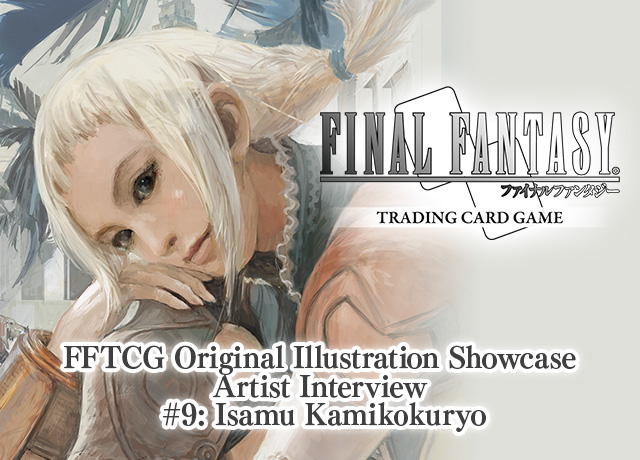
FFTCG Illustration Showcase
Interview #9: Isamu Kamikokuryo
The FINAL FANTASY TRADING CARD GAME is a tabletop trading card game enjoyed by players all around the world, featuring characters and monsters from the FINAL FANTASY series. Some cards are decorated with familiar art, and others with FFTCG-original illustrations!
We’ll be showcasing these original illustrations along with artist interviews. Some of the art will even be available as wallpaper from the FF Portal App!
Interview with Isamu Kamikokuryo, Plus Original Illustrations
We spoke with Mr. Isamu Kamikokuryo, who is handling FFTCG illustrations of FINAL FANTASY XII, about the illustrations he provided.
Isamu Kamikokuryo
Worked as art director on FINAL FANTASY XIII as well as contributing to titles such as FINAL FANTASY X, FINAL FANTASY XII, and FINAL FANTASY XV. Now active as a freelance designer, which includes handling the first decorative sliding screen illustrations in 400 years at Daitokuji Shinju-an, a temple in Kyoto with connections to the famous Zen Buddhist monk and poet Ikkyu, in 2018.
―First, we’d like to know a little about you personally. Can you please tell us about your work up until now?
Kamikokuryo: I first joined Square Enix part-time, when they had just begun the project for FINAL FANTASY X, so I was assigned to the FFX art team as a background artist. It was an arrangement where I would be creating art while also checking graphics data, and I did things like putting finishing touches on background model textures so they would look good for the final game. After FFX finished, I was assigned to the FINAL FANTASY XII team. While I did continue to be involved in background art there, partway through development I was given the responsibility of watching over all background design as background art director too. When the development of FFXII got to be about 80% complete, I was also asked to be on the FINAL FANTASY XIII team as art director by producer Yoshinori Kitase. That led successively to my position as art director on FINAL FANTASY XIII-2 and LIGHTNING RETURNS: FINAL FANTASY XIII as well. After that I was one of the art directors for FINAL FANTASY XV. During FFXV’s development I also helped with The 3rd Birthday, and after seeing FFXV through to launch I left Square Enix. I currently am active as a freelancer, but I’ve been given various work with Square Enix even after leaving.
―I see, so you primarily handled art direction at Square Enix.
Kamikokuryo: Yes I did, but at Square Enix art direction is often done by lead artists. So you would draw pictures like the key visual for a game while also handling art direction – a heavy responsibility, to say the least. First you would create the art design for each element of a game, then supervise the creation of those models, and you would also check how the models look in-game. It was a colossal work load.
―You’ve been involved in many games, but which ones left an impression on you?
Kamikokuryo: It’s hard to choose because I’m attached to all the titles I’ve worked on. FFX was the first assignment of my career, so there were many difficulties and it was a great learning experience. FFXII was a title involving Mr. Yasumi Matsuno and so many other legendary creators. There were essentially several art directors, and my work on that title was really led by the directors around me.
But the most memorable one is FFXIII. I came to do art direction for that game by myself right as all the art directors who had helped me during my time working on FFX and FFXII went off to other teams. The pressure was just massive. FF is a long-running series - how could I contribute to the next part of that without ruining its history and brand? There is no “can’t” when it comes to FF; I absolutely must see this through to its finish. These are all things I kept in mind as I focused on the project. There were a lot of new people in the FFXIII art staff so we experienced many issues, but in the end, we were able to make something that had never been done before and we finished the creation of a new FF ourselves. So I would say that’s the most memorable title I’ve worked on.
―Indeed, FFXIII’s world is unlike anything in any FF before it. What concepts formed the basis on which that world was created?
Kamikokuryo: From the beginning, there was talk about going with a sci-fi style. First we asked the people in each department who were designers, regardless of their position, to just submit drawings freely, kind of like a competition. That’s the sort of thing you can only really pull off in a large project. It worked well because we were able to take good ideas from the submissions, while also getting a feel for what each individual’s strengths were. There’s also always a possibility that someone has skills outside of the work they’re responsible for, and that gave us a great opportunity to dig some of those up. When you’re given a task like creating a world for something as intensely unique as FF, and in order to create something totally new and make it a hit, I feel like it’s necessary to toss out your preexisting thought process and style in the beginning steps. I think there was a lot of meaning in doing that with FFXIII.
―We looked at some old interviews with you, and you called yourself not an artist or illustrator but rather a craftsman. What would you consider to be the role of the art team in game creation?
Kamikokuryo: Showing things that don’t exist in reality as real – basically, it’s swindling! You could say it’s like making people believe a lie to be truth. And, the first people you need to convince are the staff in your team. If you can get them onboard, get them to want to make this thing, they’ll take the idea you’ve given them and slowly but surely turn it into something. You start from a position of total lack of understanding, but as they gradually gain a grasp of the features and characteristics of your vision, in the end the staff get to where they have the confidence that they no longer feel the need for me to check their work. It took quite a while to reach that point, and to get the staff’s understanding I feverishly prepared materials, thinking of potential scenes and drawing pictures and so on.
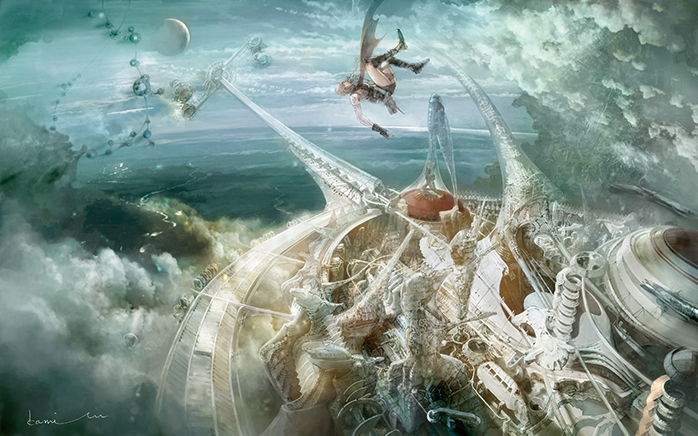
FFXIII “Eden” full view image
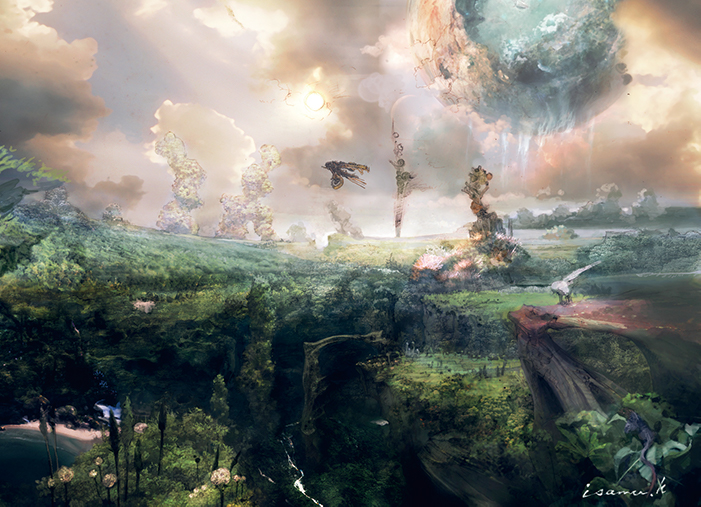
FFXIII “Arrival on Gran Pulse” image
Of course it’s nice to look at “cool” or “pretty” pictures, but that’s such a trivial thing, and what I really think is most important is whether your thoughts and feelings get through to the people who look at your images. Just because you can look at a picture someone drew and get a grasp of their technique from it, that doesn’t mean that technique is the essence of a piece. It’s important to consider what you want to convey through a picture, and who you want to convey that to. I really think that can make a big difference in what you’re trying to accomplish within a piece. In that sense, I and other art designers aren’t artists or illustrators, but rather creators. That’s what I was saying in previous interviews.
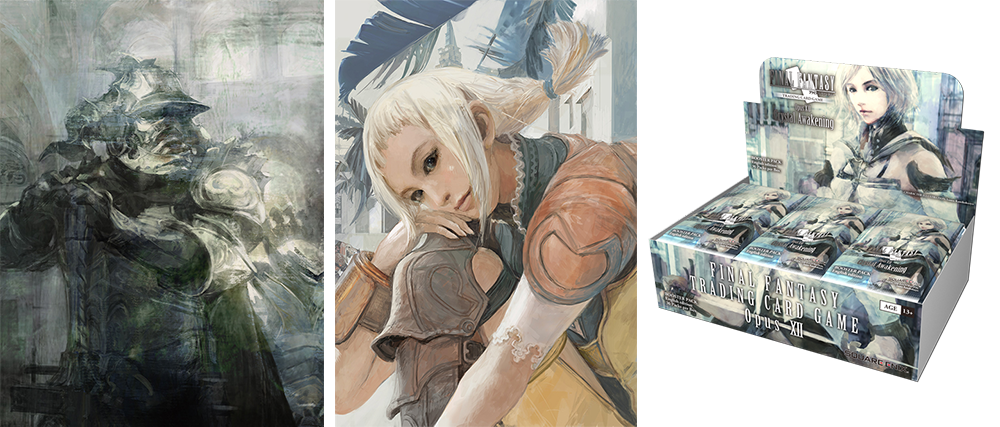
―How did you end up receiving the request to do FFXII illustrations this time? Also, had it been a long time since you had drawn FFXII characters?
Kamikokuryo: This time I drew Judge Gabranth, Penelo and also Ashe*. I was requested to draw them in a different style from the promotional illustrations or character design sheets for the original game. It had of course been a long time since I’d drawn FFXII characters, and illustrations for that game were almost all done by Mr. Akihiko Yoshida and Mr. Hideo Minaba, so there was actually only one time I did illustration work during FFXII’s development.
*Revealed on the package for Opus XII: Crystal Awakening, planned for release in July.
―Were there any common themes between these illustrations, or things you took special care to keep in mind knowing they’d become cards?
Kamikokuryo: During the first meeting for these I was told that they wanted me to draw in a way I never had before, to try and challenge myself to do something new. I heard that in the FFTCG illustrations up to this point, people drew in the opposite of their usual style, whether that be cute or realistic or whatever, and I thought that was an interesting idea. But I figured no one would enjoy a cutesy drawing by me. [laughs] So after some consideration, I decided to use a hand-drawn style unlike CG art.
Also, while I did use the original character illustrations for reference, what players see more than anything is the in-game models. Based on that, I mainly referenced the 3D model data generated by the game hardware itself, since that’s probably closest to the image everyone has of the characters and I wanted to stick to that both in the impression the illustrations would leave and in a design sense.
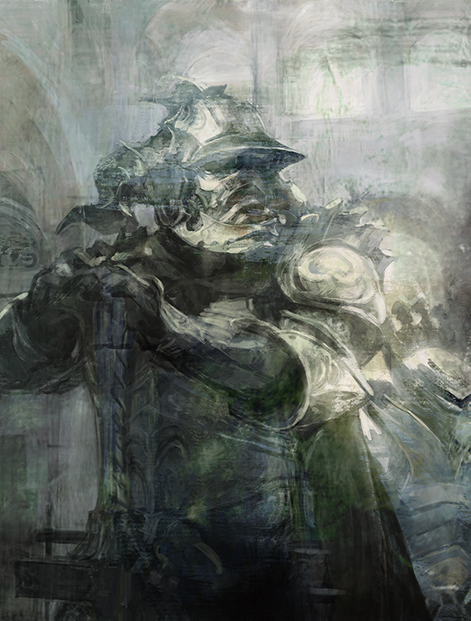
I drew Judge Master Gabranth in the image of an oil painting, scanning in my own physical works for use as textures to really bring out an analog aesthetic. It feels to me like the world of FFXII might be well-suited to this style. FFXII also has a lot of fans outside Japan, so I received many messages about this illustration from people in various countries. On top of having a complex design, there have never been many illustrations of Judge Master Gabranth, so drawing him is difficult. Mr. Yoshida has a unique way of creating characters with complicated 3D designs that are hard to get a grasp on, but if you can get the main points down like in this illustration, it’s very clear that it’s Gabranth.
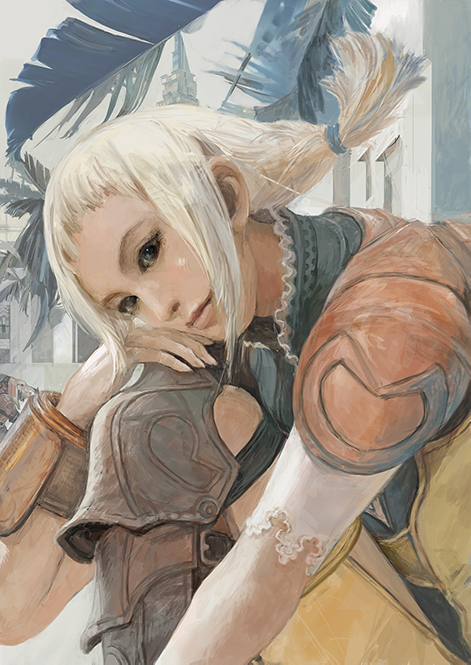
I decided to continue with the oil paint theme for Penelo. Mr. Matsuyama―the person who oversees FFTCG―told me that this time they wanted me to not only try a new drawing style, but to portray the character in a way that hasn’t been seen before. In game Penelo is always by the main character’s side, acting bright and energetic. However, I took a different approach to that and drew her with an expression that suggests she’s got some kind of sorrow hidden deep down. I also was torn on whether it would be better compositionally to set the perspective further back since this would become a card illustration, but ended up cutting the picture off up close. And I made the background very flat, in a kind of ukiyo-e (Japanese woodblock prints of everyday life from the 17th to 19th centuries) style.
―What do you think of these cards seeing them in person? [while looking at the cards]
Kamikokuryo: These are very nice! I hate to sound full of myself, but especially the color of Penelo’s hair and skin stick close to the in-game model, so I feel that you might be able to get a sense of a more lifelike Penelo here while still maintaining the impression everyone has from the game. I think it would be really interesting if game console specs became good enough that there could be moving models of this quality.
―Was there anything you struggled with doing these illustrations?
Kamikokuryo: I’m not employed by Square Enix anymore, but as long as I’m drawing these illustrations, I become an official representative of Square Enix to the fans. And there’s a big hurdle to the level of quality expected from official Square Enix artists that kind of needs to be surpassed if I’m going to be drawing these characters! [laughs] I felt that I couldn’t do dishonor to FFXII or Mr. Yoshida’s character designs, so there was an incredible amount of pressure.
―So you really were dealing with some intense pressure! You said that for these illustrations you stayed faithful to the world of FFXII, and specifically to the in-game models – was there no option to perhaps go with your own artistic style here?
Kamikokuryo: This is my own personal thought process, but I feel that the only person who has the right to do that is Mr. Akihiko Yoshida. If you’re the parent who gave birth to these characters, then I think you can tamper with them as you wish, but I’m only being entrusted with them for a little while. I can’t just change them on my own whim, and I don’t think it’s okay to do that.
―Is there anything that’s changed working as a freelancer now compared to when you were at Square Enix?
Kamikokuryo: When you’re employed by a company, your individual role is very clearly defined. Although everyone honestly should be keeping the budget of a project in mind, individual creators don’t really think about that. They can just focus on making a good character, or background, or whatever their assigned role is. Some people think that all staff should operate with a full understanding of the entirety of a project, but companies have the unique option to divide labor up based on staff’s strengths and weaknesses to accomplish things that wouldn’t be possible for an individual. As a company employee, there was a part of me that was willing to really push to accomplish exactly the result I had in mind, because clearly if I made something good and it made money in the end, that was enough.
But as a freelancer everything comes right back to you, so you can’t operate like that. For example, there could be four offers from different companies and one of them is really interesting, so I decide to just do that one – of course that doesn’t fly in freelancing. I think one of the merits of being at a company was the option to make time adjustments or changes to my work. If I was feeling under the weather other people could cover for me until I got better, and being able to make things work by switching out members of a team like parts in a machine, supporting each other, is the strong point of an organization. Now that I’m a freelancer, it’s become necessary to use reasoning skills and practice self-control more than before. I think the typical image people have is that company employees are responsible and freelancers can do whatever they want, but I’ve actually felt it to be the opposite. If your desire is to draw freely, I recommend joining a company, and once you’ve gotten enough experience that you feel ready, maybe consider freelance. [laughs]
―In a previous interview you said something along the lines of FFXII being the peak of your ability to draw detailed sketches...
Kamikokuryo: Physically FFXII’s development was undoubtedly my peak, and since then my vision has gotten considerably worse to the point where there are parts of my sketches from that time that I can no longer see. There was a certain person at a solo exhibition I did a couple years ago who brought a magnifying glass because they couldn’t see the pictures very well, and they ended up giving that to me as a gift! That magnifying glass got heavy use during my exhibition – everyone was using it. I have it at home now. The legendary magnifying glass! [laughs] So yes, I’m aware that around FFXII was the time I was able to draw at my most detailed. Lately I’d been using digital drawing tools, but have started to feel that using pencil is important as well, so I’ve begun doing that. But I can’t really see what I’m drawing, so I sort of estimate. Although after scanning those pencil drawings and opening them in my computer, they’re a mess. [laughs] Even then, I want to revive my pencil drawing skills so I’m working at it.
―You’re well known for drawing concept art of worlds and settings, but which do you like more – drawing people or scenery?
Kamikokuryo: Oh, without a doubt worlds and settings. I’m of the opinion that you can’t draw people using logic, and artists who can draw people well aren’t analytical. That kind of person can throw a drawing together in three minutes and it still looks amazing. Maybe you could say that the human form can’t be defined by simple logic. It’s not entirely correct to say that I’m only interested in problems that can be solved with logic, but when drawing I’m intensely rule-based and theoretical. I think it’s similar in architecture, but to give an example I might say, “If I were to add a pillar here...” or, “It would look nicer if I adjusted this angle.” I’m extremely logical like that. Character art is in a totally different category from that, so I’m quite sad at my lack of ability in that sense. Based on that I have a sense of respect for people who can draw characters well, and on the other hand I’ve also got a strong sense of dread toward them. [laughs]
―If you have any series or characters from FF you’d like to try drawing, please tell us.
Kamikokuryo: I’m going to have to say that my favorite character is Lightning from FFXIII. She’s also the character I’ve drawn the most promotional art and posters and the like for, although I don’t do much illustration work. Mr. Tetsuya Nomura checked the work I did of Lightning, and I was allowed to come up with the composition and poses myself, but he didn’t shoot me down too many times, so I like to think that he trusted me when it came to her. [laughs] Lightning is a character designed by the Tetsuya Nomura that I was able to create a lot of material to help deliver to the world, so I’m very attached to her. It would make me happy if I were asked to do an illustration of Lightning. I also think Yuna from FFX is a very good character; you might say she’s picturesque. I was blow away by her outfit in that Japanese style, almost like a kimono, and it really drove home for me how incredible Mr. Nomura’s character designs are. It was the kind of thing you wouldn’t ever imagine but still felt so natural, and a design no one else could have come up with.
―Hopefully someday we can see an illustration of Lightning by you! Thank you for your time today.
#1: Toshitaka Matsuda
#2: Ryoma Ito
#3: Toshiyuki Itahana
#4: Roberto Ferrari
#5: Kumiko Koike
#6: Akira Oguro
#7: Yasuhisa Izumisawa
#8: Akane Saito
Original Artwork Wallpaper
Isamu Kamikokuryo’s original illustration of Penelo is now a wallpaper!
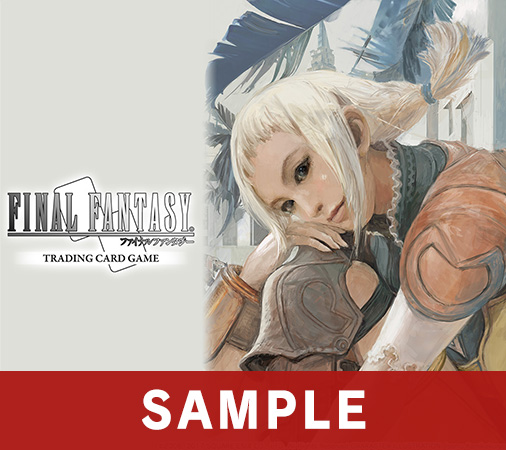
Wallpaper: Original Illustration "Penelo"
Valid Until: 5.31.2020 (GMT)
▼Go to the link below to access the Item Exchange▼
What is FFTCG?
FFTCG is a one-on-one tactical card game featuring FINAL FANTASY characters and summons. Not only is there fun in collecting cards featuring familiar faces, the main draw of the game is the simplicity of the rules combined with the complexity of the gameplay. The art drawn for the game by famed illustrators is also a popular aspect of FFTCG!
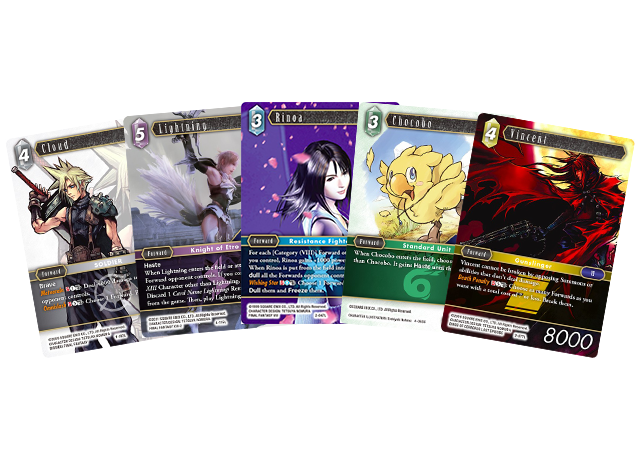
Find out more about FFTCG, including upcoming products and events at:
NA: https://fftcg.square-enix-games.com/na
EU: https://fftcg.square-enix-games.com/en
Play the FFTCG tutorial:
https://sqex.to/FinalFantasyTCG
FFTCG Official Facebook (NA)
FFTCG Official Facebook (EU)
FFTCG Official Twitter
LOGO & IMAGE ILLUSTRATION:© YOSHITAKA AMANO